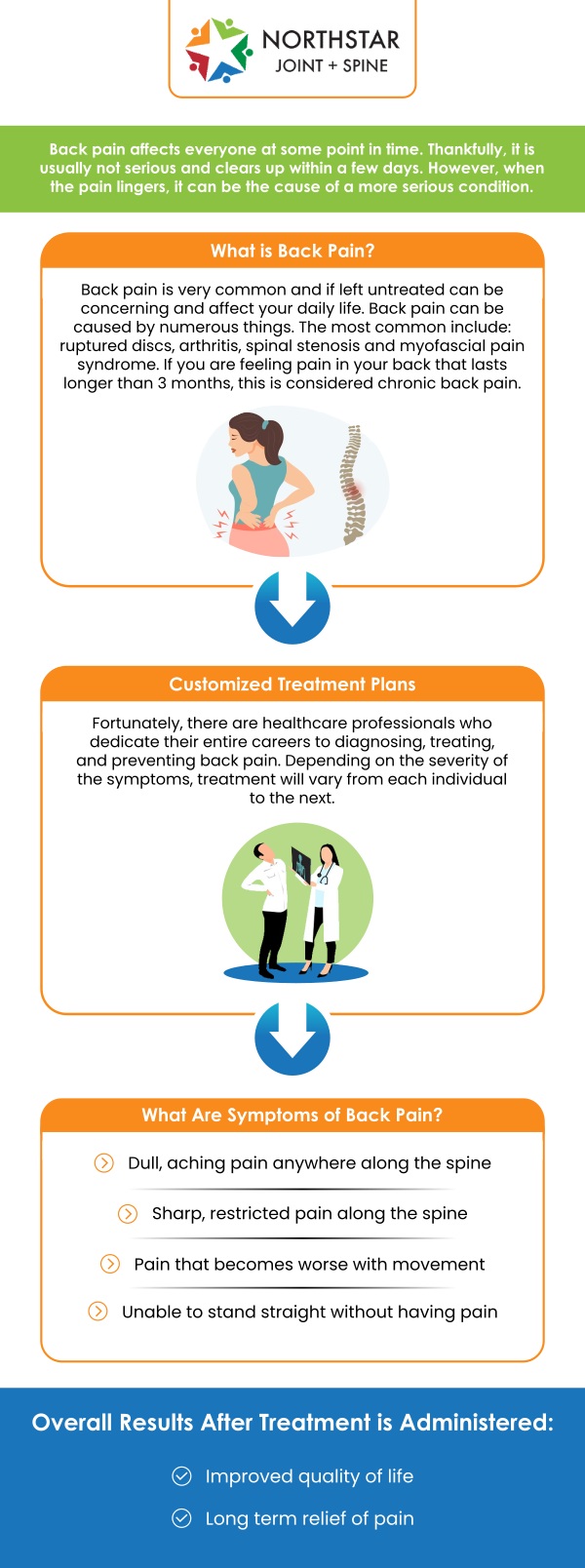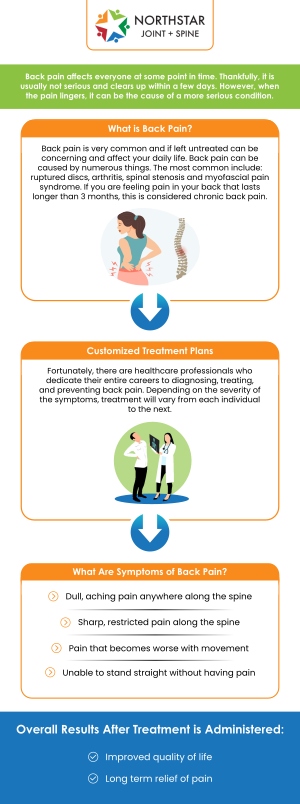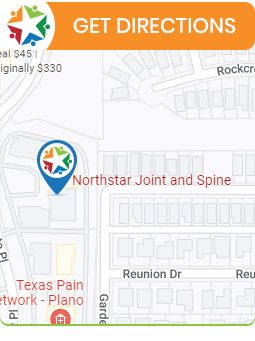Persistent Pain after Back Surgery Q&A
Persistent pain after back surgery can manifest as chronic discomfort, stiffness, or localized pain in the lower back. Symptoms may include limited mobility, muscle weakness, and radiating pain into the legs. In some cases, patients may experience numbness or tingling sensations as a result of nerve irritation. At Northstar Joint and Spine, Board Certified Dr. Robert J. Nocerini, MD, specializes in diagnosing and treating persistent pain after back surgery to help improve function and alleviate discomfort. For more information, contact us today or schedule an appointment online. We are conveniently located at 7704 San Jacinto Pl Suite #200 Plano, TX 75024.


Table of Contents:
What are the possible causes of ongoing pain after back surgery?
Is it normal to have severe pain after back surgery?
When should I be concerned about back pain after surgery?
How is persistent post-surgery pain diagnosed?
At Northstar Joint and Spine, we understand that persistent pain following back surgery—often referred to as Failed Back Surgery Syndrome (FBSS)—can significantly impact your quality of life. Our experienced specialists are committed to identifying and addressing the underlying factors contributing to ongoing discomfort, helping you regain mobility and relief.
Failed Back Surgery Syndrome (FBSS) can occur for several reasons. A common cause is residual or recurrent disc herniation, where remaining disc material continues to compress nerves or surrounding tissues. Additionally, scar tissue formation (epidural fibrosis) following surgery can irritate nearby nerves, leading to chronic pain.
Incomplete decompression during an initial procedure may leave pressure on nerves, causing persistent symptoms. Surgical complications, including nerve damage or instability due to excessive removal of bone and tissue, can also lead to ongoing discomfort. For patients who have undergone spinal fusion procedures, adjacent segment disease, where segments above or below the treated area experience increased stress and degeneration, may emerge as a source of new pain.
Although rare, postoperative infections could cause inflammation and lingering discomfort. Psychological factors such as stress, anxiety, and depression may further complicate recovery by intensifying the perception of pain and impeding healing.
At Northstar Joint and Spine, we emphasize thorough diagnostics and personalized treatment plans. We recognize that incorrect initial diagnoses or treatments that did not fully address the true underlying spinal condition can also contribute to ongoing symptoms. We carefully evaluate each patient to ensure an accurate diagnosis and recommend effective solutions.
Lastly, lifestyle factors such as smoking, obesity, poor posture, and inactivity can impair healing and worsen postoperative outcomes. Our multidisciplinary team provides comprehensive care, incorporating physical rehabilitation, lifestyle counseling, and minimally invasive interventions to help patients achieve optimal recovery.
If you are experiencing persistent pain after back surgery, we are here to provide compassionate, expert care designed to address the root cause of your symptoms and help you return to a pain-free life.
Experiencing some level of discomfort following spine or joint surgery is generally considered normal; however, severe or persistent pain can signal complications that require prompt medical attention. At Northstar Joint and Spine, we understand that patients may initially experience mild to moderate pain following procedures, due to surgical damage, tissue inflammation, incision healing, and the body’s natural recovery process. Typically, this postoperative discomfort gradually diminishes over the days and weeks following surgery as your body heals and regains strength.
However, severe pain that does not diminish or intensifies over time can indicate potential complications such as infection, nerve irritation, excessive scar tissue formation, or issues related to surgical hardware, such as implants or screws. Additionally, if severe pain is accompanied by symptoms like fever, swelling, numbness, tingling, weakness, or discharge from the surgical incision, it is important to seek medical evaluation immediately.
Our highly experienced specialists are committed to helping you safely navigate your postoperative recovery. We encourage patients experiencing persistent or worsening pain to communicate openly and promptly with our medical team. Through careful assessment, we can identify the underlying cause and provide personalized care, including medication adjustments, physical therapy, targeted pain management techniques, or additional diagnostic imaging or intervention as needed.
Early intervention and dedicated follow-up care at Northstar Joint and Spine help ensure proper healing, maximize recovery, and improve your quality of life.
Experiencing back pain after a surgical procedure is fairly common, and at Northstar Joint and Spine, we understand the importance of closely monitoring your recovery journey. Postoperative discomfort often arises from factors such as prolonged immobility, positioning during surgery, or simply the body’s natural healing process. Typically, this type of pain gradually diminishes as your body recovers.
However, our specialists at Northstar Joint and Spine emphasize certain situations that require closer attention and timely medical evaluation:
• If your back pain persists beyond the expected recovery timeline or worsens instead of improving over days or weeks, it’s important to seek prompt evaluation from our providers.
• Symptoms such as fever, chills, noticeable redness or warmth around the surgical site, or any drainage from the incision may indicate an infection and should be addressed immediately.
• If your postoperative back pain is accompanied by new neurological symptoms, such as numbness, tingling, weakness, or loss of bladder or bowel control, this could indicate nerve compression or damage and requires swift medical attention.
• Severe pain that does not respond effectively to prescribed medications or significantly disrupts your daily activities, rest, or rehabilitation exercises needs prompt attention from the Northstar Joint and Spine team.
At Northstar Joint and Spine, we encourage open communication about your symptoms. If you have any concerns regarding the severity, duration, or characteristics of your postoperative back pain, please reach out promptly to our experienced providers. Early identification and timely intervention are essential in ensuring optimal recovery and minimizing potential complications.
Persistent post-surgery pain is carefully evaluated and diagnosed at Northstar Joint and Spine through a personalized and comprehensive clinical assessment by our expert medical team. Our diagnostic process begins with an in-depth review of the patient’s medical history, focusing specifically on details surrounding the surgical procedure, the nature and characteristics of the patient’s pain, and the duration and development of symptoms. Our clinicians thoroughly discuss with each patient the exact location, intensity, frequency, and any factors that aggravate or relieve their pain, ensuring personalized care and attention.
A detailed physical evaluation is conducted at our facility to pinpoint potential sources of ongoing discomfort, including nerve irritation, inflammation, or tissue damage. Our specialists meticulously assess sensory and motor functions, identify areas of tenderness or heightened sensitivity, and evaluate signs of nerve-related issues like numbness, tingling, or muscle weakness.
When needed, Northstar Joint and Spine suggests advanced diagnostic imaging tools, including MRI, CT scans, ultrasound, and X-rays, to reveal structural abnormalities or surgical complications that may contribute to persistent symptoms.
To fully understand the patient’s experience and how persistent pain impacts their daily activities and overall quality of life, we also incorporate validated pain assessment scales and questionnaires into our evaluation process. These tools help our clinicians accurately gauge the severity and functional impact of ongoing discomfort, guiding individualized treatment decisions.
Ultimately, at Northstar Joint and Spine, diagnosing persistent post-surgical pain involves ruling out other possible medical conditions or complications, determining if the pain is directly related to the surgical procedure, and assessing whether symptoms persist beyond the expected healing timeline. With an accurate and thorough diagnosis, our skilled medical professionals develop tailored treatment strategies designed to address each patient’s unique needs and improve their quality of life. For more information, contact us today or schedule an appointment online. We are conveniently located at 7704 San Jacinto Pl Suite #200 Plano, TX 75024. We serve patients from Plano TX, Willow Bend TX, Frisco TX, Allen TX, Addison TX, North Dallas TX, and surrounding areas.

Check Out Our 5 Star Reviews


Additional Services You May Need
▸ Back Pain
▸ Shoulder Pain
▸ Chronic Pain
▸ Epidural Steroid Injections
▸ Spinal Cord Stimulation
▸ Viscosupplementation
▸ Genicular Nerve Blocks
▸ Facet Injections
▸ Joint Injections
▸ Sacroiliac Joint Injections
▸ Lumbar and Cervical
▸ Facet Medial Branch Blocks
▸ Diagnostic Nerve Blocks
▸ Medication Management
▸ Neck Pain Doctor
▸ Diabetic Peripheral Neuropathy
▸ Headaches
▸ Suboxone
▸ Peripheral Nerve Stimulation
▸ Spine
▸ Joints
▸ Muscles
▸ Bones

Additional Services You May Need
▸ Back Pain
▸ Shoulder Pain
▸ Chronic Pain
▸ Epidural Steroid Injections
▸ Spinal Cord Stimulation
▸ Viscosupplementation
▸ Genicular Nerve Blocks
▸ Facet Injections
▸ Joint Injections
▸ Sacroiliac Joint Injections
▸ Lumbar and Cervical
▸ Facet Medial Branch Blocks
▸ Diagnostic Nerve Blocks
▸ Medication Management
▸ Neck Pain Doctor
▸ Diabetic Peripheral Neuropathy
▸ Headaches
▸ Suboxone
▸ Peripheral Nerve Stimulation
▸ Spine
▸ Joints
▸ Muscles
▸ Bones






